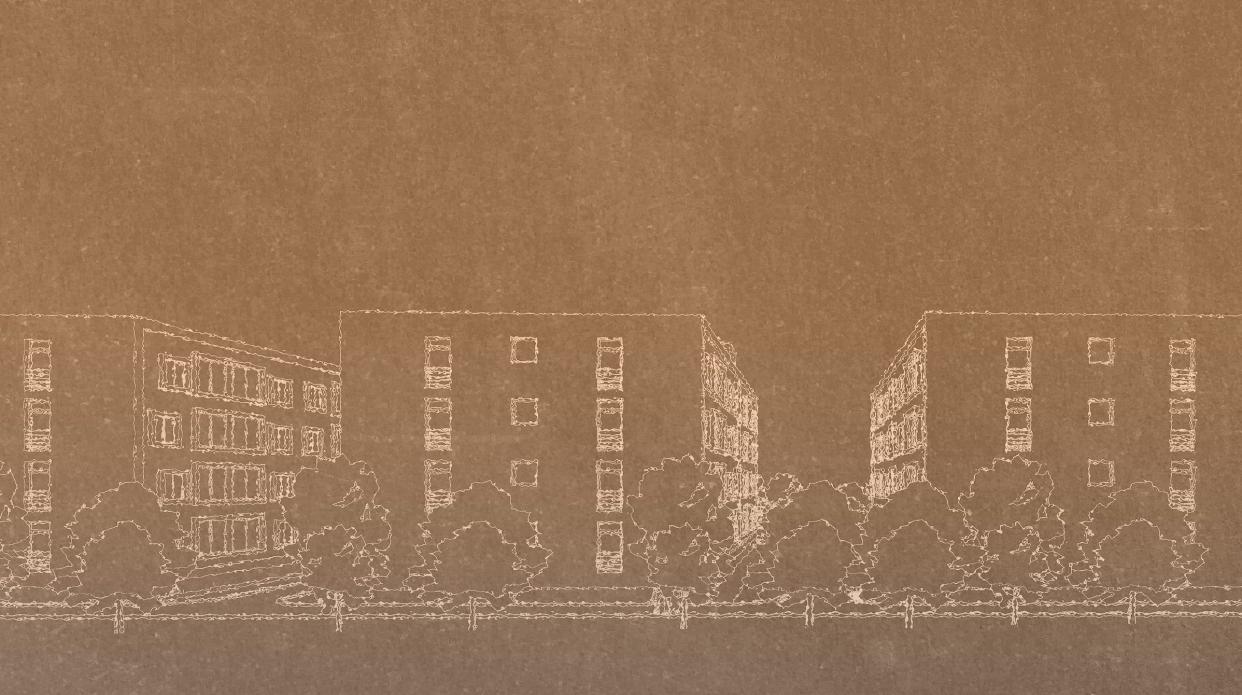' 'Apartment' is the longest four-letter word': Rezoning challenges Phoenix-area developers

NIMBY-ism in the Valley:
Not in my backyard| There, not here| Rezoning hurdles| Targeting City Hall | What needs to change?
The barriers to building affordable housing can sometimes start even before a plot of land is chosen.
“When you look at most cities’ general plan maps, you will see almost no multifamily-zoned land,” said Dan Klocke, development project manager for affordable housing developer Gorman and Co.
“It’s a huge issue because then you have to go through a zoning case, and the cases can get pretty ugly.”
A zoning change requires multiple rounds of public hearings and approval from the City Council. Because land zoned for apartments is so difficult to come by, most apartment developers — affordable or not — need to go through the process before building a project.
The zoning change process is expensive. There are legal costs for a zoning attorney, money for hiring experts to write impact studies that answer questions like how the apartments will affect traffic, schools and the provision of public services, and staff time spent on various meetings and submittals.
Those expenses add up, and are no guarantee ground will be broken.
'Apartment' is a four-letter word
“It costs us $250,000 to $300,000 for a zoning case,” said Rob Lyles, co-founder and senior partner at Greenlight Communities, which develops apartments that it describes as "attainable" for renters. The company focuses on building properties for essential workers and doesn't use government subsidies.
Lyles said Greenlight doesn't even get to the point of a public hearing if it doesn't feel confident it will get council support, simply because of the cost of the process.
Apartments can be permitted in areas with some commercial designations, but higher-density or taller buildings often require a zoning change. Even in a geographic area where a general plan — a city's blueprint for future growth and development — might allow for apartments, a particular piece of land might not have the proper zoning.
Cities hesitate to give up commercially zoned land in favor of apartments, said Greg Vogel, founder and CEO of Land Advisors Organization, which aids companies in acquiring and developing land parcels for a range of uses.
“You don’t see a whole group of people going to city hall to speak in favor of apartment buildings,” Vogel said.
For a developer like Greenlight, finding land that already will accommodate apartments is ideal, but getting to be more difficult, Lyles said. Of the 10 projects Greenlight has in the pipeline, only one is on a site that already was zoned to allow apartments.
“As soon as I tie up a site, I’m checking the neighborhoods for opposition,” he said. “All zoning cases are hard, but some are really hard.”
Staunch opposition to apartment construction started in higher-end cities and neighborhoods, he said, “but now it’s become Valleywide.”
When Grady Gammage Jr., founding member of Gammage & Burnham, teaches law students, he tells them, “'Apartment' is the longest four-letter word.”

“Apartments have always been hugely controversial in Phoenix,” he said. “There has always been intense antipathy toward apartments, but now it is much more organized.”
Gammage said City Councils around the Valley acknowledge the need for affordable housing and support the idea “in the abstract,” but that support can quickly change when the rubber meets the road.
'Devastating': When zoning cases go to the ballot
All zoning cases in Arizona are “legislative,” meaning they create a policy that will be applied in the future. The role of City Council members is to make a decision based on a subjective review of the case, specific to that case. All legislative decisions in Arizona are subject to referendum, meaning that constituents can petition to have the decision put on a future ballot.
“When I started as a zoning attorney, I don’t think we even realized zoning could be taken to referendum,” Gammage said. “It started to happen more in the '80s, but it was for very high-profile cases. A referendum is just devastating to a developer. The election could be two years after the zoning case.”
While it’s rare for a case to get to the ballot, some of the Valley’s most controversial cases have been withdrawn when faced with the threat of a referendum.
Long before running for president, in 2004, Donald Trump planned a high-rise hotel and condominium development near 24th Street and Camelback Road. The Phoenix City Council narrowly approved the proposal, but opponents gathered enough signatures to force a referendum vote. Rather than hold an election, the council voted to reverse the decision and deny the project.
More recently, in 2020, developer Carter Unger withdrew a plan to build a mixed-use project called Southbridge II along the canal in Scottsdale. The proposal had been approved by the Scottsdale City Council but elicited significant opposition from residents. Thousands of residents signed petitions to put the measure on a ballot, but the council opted to withdraw its approval of the project instead.
Some projects do prevail when put to a public vote. The Ritz Carlton Paradise Valley, which has been under construction for years, was subject to a referendum before the Great Recession. Voters ended up voting in favor of the resort, but plans were paused for a while during the economic downturn. Construction has come in stops and starts since.
“After neighborhood groups became more organized, they realized what a potent tool referendum was,” Gammage said.
An attempt to force a referendum in Surprise over affordable housing is still working through the court system. The Arizona Supreme Court ruled that the city clerk overstepped her authority by dismissing the signatures the group had collected to get the measure on the ballot but said the developer still could challenge the signatures' validity. The City Council narrowly voted to approve the housing complex, which calls for 601 affordable apartment and townhome units to be built near Cotton Lane and Waddell Road.
Housing needs are dire as population grows
Gammage said even homes that are owner-occupied but designed to be more affordable can face community opposition, pointing to lots planned to be smaller than typical for an area.
Home affordability can change significantly based on the size of the lot the house sits on, he said.
“Lot size has become a proxy for income,” Gammage said.
When the Valley was first growing, many people looking to buy a first house subscribed to the idea of “drive until you qualify,” with many moving to the West Valley where home prices were lower than central Phoenix, said Vogel, the head of Land Advisors Organization.
Now, many West Valley communities have homes worth more than $1 million, and those seeking affordable ownership options are driven to even farther outskirts.
“If you go out past Queen Creek, to Maricopa or Casa Grande, things are more affordable,” Vogel said.
Unlike traditional apartments, Vogel said, single-family rentals — developments that look like small or average-size houses but are instead owned and managed like apartments — can sometimes be more palatable to a neighborhood. But these rental houses do not build equity or act as an investment like a "starter home" would.
Vogel said there are “a lot of constraints that need to be relieved” when it comes to making way for additional housing, but the needs are dire.
“If you are growing by 80,000 people per year, you need to build 35,000 houses just to maintain, not to get out of the shortage,” he said.
Klocke agreed and said the time it takes to get one apartment project approved shows how difficult it will be for metro Phoenix to address the shortage.
“We need tens of thousands,” Klocke said. “If I have to spend four years to get 200 units, how can we do that?”
Developer: Apartments subsidize single-family infrastructure
Some of the arguments and worries against high-density housing ignore some key facts, Klocke said.
“Taxes that single-family homes pay are not sufficient to pay for the infrastructure around them,” Klocke said. “Apartments are, in fact, in some ways, subsidizing the development of single-family homes.”
Klocke pointed at an example of a downtown Phoenix apartment tower, which has nearly 200 apartment units and 300 feet of road around it. For 200 single-family homes, the development would need a mile of road, and water and sewer lines, which taxes are then used to maintain.
“We are kind of shooting ourselves in the foot,” Klocke said. “We can’t house our own kids, and we are creating a bill to pay for infrastructure.”
The irony, Klocke said, is many of the world’s most desirable cities to live in, and those with the highest property values, are densely populated, walkable and have housing for a mix of incomes.
“The neighborhoods that people love are typically mixed-use, walkable neighborhoods with lots of apartments,” he said. “Those areas are safer, too; there are more eyes on the street.”
For Klocke, breaking a stigma against affordable apartments depends on the developer and property manager.
“It is incumbent that it looks good, is managed well, and you’re in for the long term,” he said. “When you are the developer, you have to take that on.”
Making affordable housing more tolerable to communities is essential as the need continues to grow, he said.
“If you want a neighborhood that serves everybody, then you need apartments,” he said. “Unless we are willing to say we want a variety of housing, then we are going to struggle.”
Coming Thursday: When people oppose apartment construction, they go to city hall. Here's why
Next up:
When people oppose apartment construction, they go to city hall
Corina Vanek and Taylor Seely
Arizona Republic
Fights over housing take place at city hall.
It's where developers, elected leaders and residents come to argue over what, where and whether something should be built. That's because mayors and city councilmembers decide how land is used. It's why, in most Arizona cities, homes sit next to homes and Walmarts next to Home Depots.
So when homeowners object to a proposed apartment complex or other multifamily residential development, they make a beeline for council chambers.
Reach the reporter at cvanek@arizonarepublic.com. Follow her on X, formerly Twitter: @CorinaVanek.
This article originally appeared on Arizona Republic: The biggest hurdle to affordable housing in metro Phoenix is rezoning


